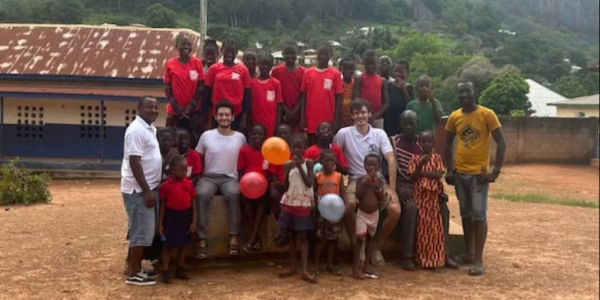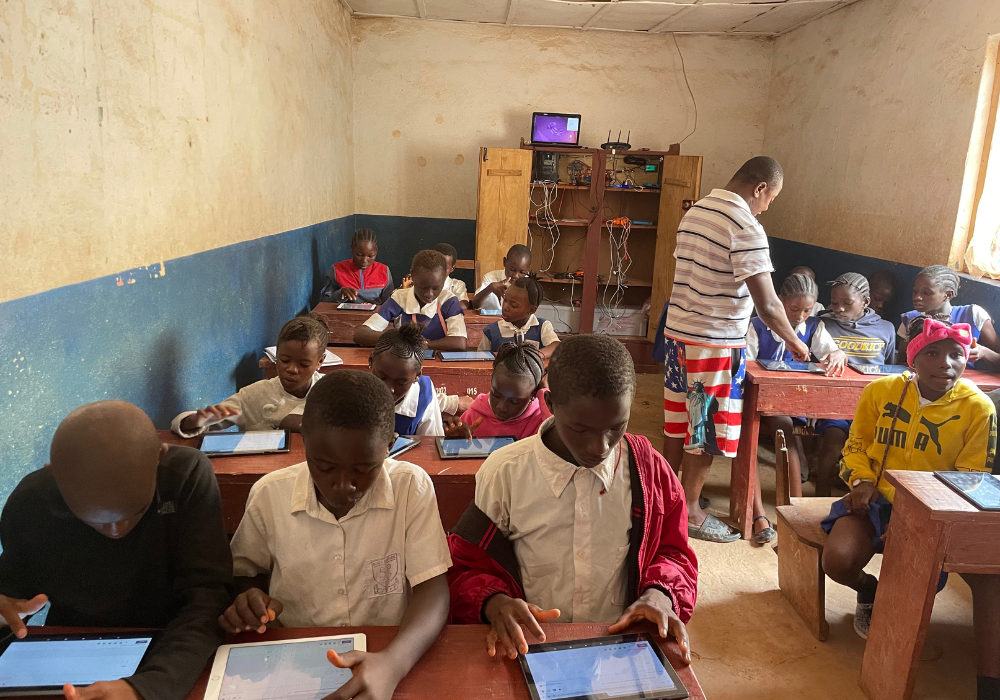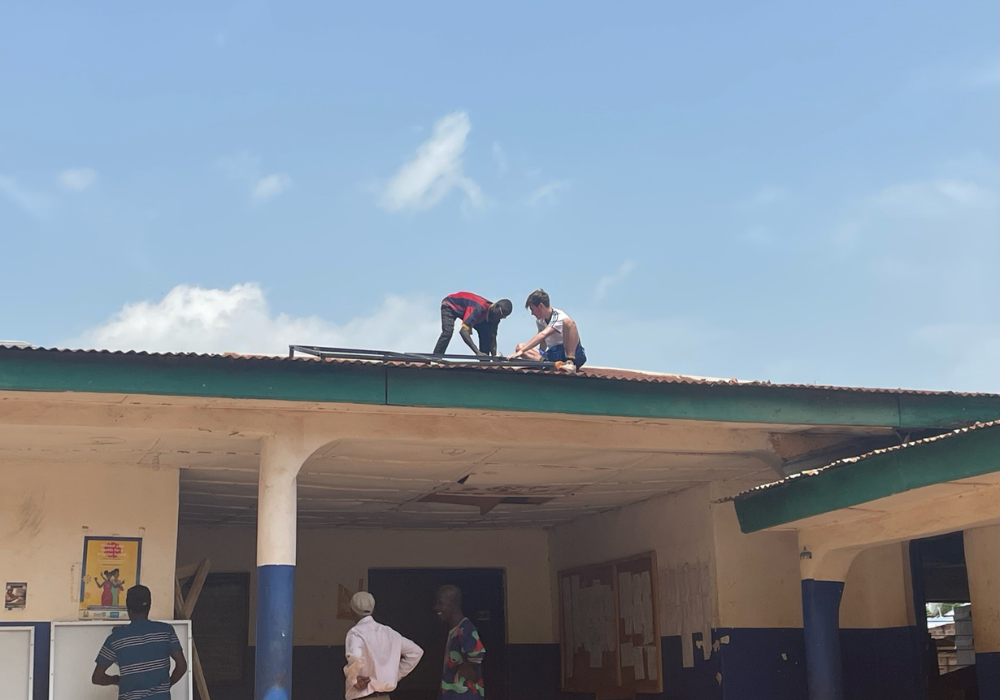
Thanks to the University Center of International Studies (UCIS) Undergraduate International Studies Fund, we (Luke Charlesworth and Christopher Kefalos) were given the opportunity to embark on a transformative journey to the West African country, Sierra Leone. This grant ensured our immersion into Sierra Leone’s unique culture by covering essential expenses like medical inoculations, in-country travel, and sustenance.
In 2021, fellow University of Pittsburgh student and native of Sierra Leone, Kaisamba Wisniewski raised awareness to us about educational inequalities in Sierra Leone, particularly its more rural districts, due to enduring effects of colonialism, civil war, and several epidemics. Kai had initiated the team that now stands as WPSL (World Possible Sierra Leone), a nonprofit organization committed to transforming student’s lives through remote-learning technology. WPSL has preliminary remote learning systems and corresponding rooftop solar systems in the three primary schools it’s working with. Being Computer Science and Electrical Engineering undergraduates, we were eager to apply our technical backgrounds with hopes of helping WPSL’s mission come to fruition.
We cooperated with school teachers to deploy RACHEL (Remote Area Community Hotspot for Education and Learning), a device to deliver virtual academic resources to students, including Khan Academy, CK12, and Wikipedia. However, each school currently has only one outdated RACHEL device for a small afterschool program due to various scalability challenges, such as high unit cost and insufficient technical knowledge within the school’s staff.
In collaboration with professors from the School for Computing and Information, Dr. Tim Huang and Dr. Luis Oliveria, we developed a prototype -- RACHEL PC – repurposing donated laptops to host RACHEL software with lower power consumption. A new solar system was also designed to meet the expected amount of user hours. With the newly developed system, we chose to focus our efforts on the DEC Primary School of Kabala.
Through several other internal funding opportunities, and with a collection of donated laptops and tablets for the classroom, we were able to obtain the necessary equipment needed for our new system. In addition to the system hardware, we also developed teacher training modules to introduce the RACHEL PC and new solar system to the teacher cohort and offer individual training on the technology’s functionality. Following these installations and trainings, we then will conduct several in-class experiments, hoping to address any unforeseen obstacles.
 After the spring 2023 term ended, we set off to Sierra Leone where we would be spending the next 5 weeks working to install our solar system and boost school efficacy of the new technologies. The experience was an enlightening juxtaposition of cultures, with us immersing ourselves in a society profoundly distinct from our own. While our objective was clear, the journey was filled with hurdles—from language barriers to infrastructural constraints. Nevertheless, every challenge taught us invaluable lessons about the importance of cultural understanding and community connection.
After the spring 2023 term ended, we set off to Sierra Leone where we would be spending the next 5 weeks working to install our solar system and boost school efficacy of the new technologies. The experience was an enlightening juxtaposition of cultures, with us immersing ourselves in a society profoundly distinct from our own. While our objective was clear, the journey was filled with hurdles—from language barriers to infrastructural constraints. Nevertheless, every challenge taught us invaluable lessons about the importance of cultural understanding and community connection.
Recognizing the pivotal role of community in Kabala, we prioritized establishing rapport with community leaders as well as the school administration. A significant, and one of the first, milestones in our journey was meeting with Mohamed Kamara, the Koinadugu District’s Minister of Education. This furthered the importance and understanding of the project’s potential impact at a district level.
After establishing ourselves with the DEC Primary School’s principal, Mr. Kamara, and several of the teachers, we initiated the installation of our solar system’s components. The school’s roof posed its own set of challenges. We found ourselves hulling the solar panels’ mounting brackets onto the roof and aligning the bracket nails as good as possible with the roof’s wooden frame. A particularly memorable scene was watching Luke and the WPSL Director, Samuel Momoh, working through the hot Leonean sun to secure the panels to the schoolhouse.
 Following the physical installation, the next phase of our intervention began, training the teachers on how to use the learning technologies. Despite teachers’ limited exposure to modern electronics, their enthusiasm and commitment to learning was evident. In a series of sessions and with translational assistance from WPSL personnel, we acquainted them with the technology, emphasizing its potential to improve classroom function.
Following the physical installation, the next phase of our intervention began, training the teachers on how to use the learning technologies. Despite teachers’ limited exposure to modern electronics, their enthusiasm and commitment to learning was evident. In a series of sessions and with translational assistance from WPSL personnel, we acquainted them with the technology, emphasizing its potential to improve classroom function.
The subsequent phase, and most impressionable for us was the integration of the technology within the classroom. Over our trip’s final three weeks, the emphasis shifted to enhancing student technology efficacy. Students began to engage with the tablets, plunging into an array of pre-downloaded digital resources. It was here where we saw the benefits of virtual learning technology. As each student’s time with the technology increased, we saw a complementary gain in their academic performance through the RACHEL PC’s internal data tracking.
After departing Kabala, we plan on employing several data-collection methods using the software embedded in the RACHEL PC and the reinforced connection with WPSL personnel and school administration. Sierra Leone’s National Primary School Exams which are held annually in the beginning of May, will serve as a valuable metric to monitor overall student progress. In the past three years, the Kabala school has averaged a 50-60% score in STEM sections. With an entire school year using the system, our goal is to elevate this number to the 70th percentile range.
In addition to our work in Kabala, we also plan on expanding our efforts to the other two rural villages, Fagudu and Sennekdugu. Similar to our pilot project, these installations won't merely be about setting up the technology but will be complemented by training sessions for school personnel. Our objective is to empower educators in these regions, equipping them with the necessary tools and knowledge to harness the full potential of our system. Our ultimate aspiration is to replicate this model in numerous communities throughout the greater region, ensuring that the power of education is accessible to all regardless of any pre-existing constraints.
Edited for clarity and length.

